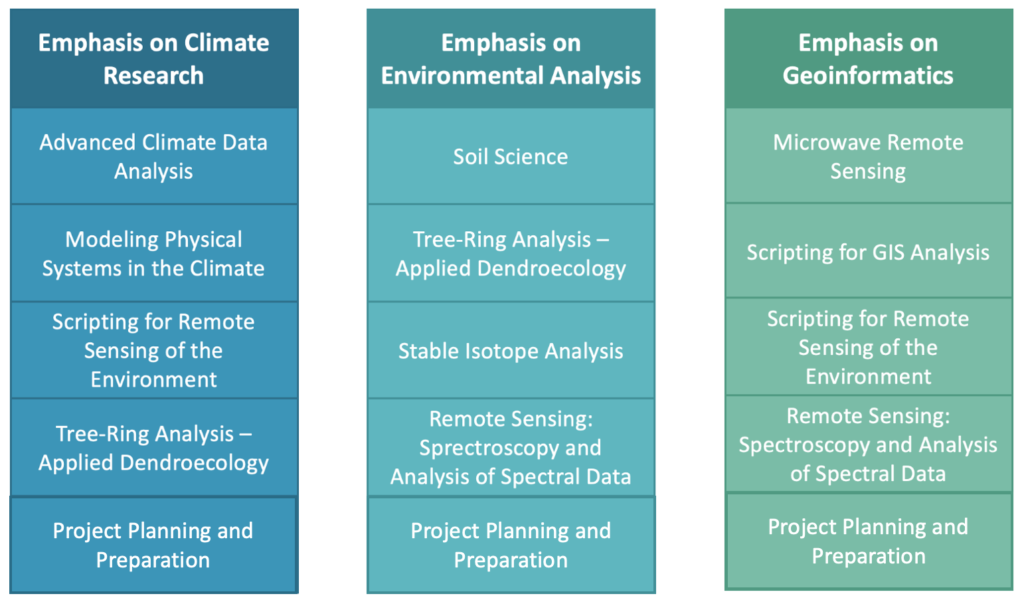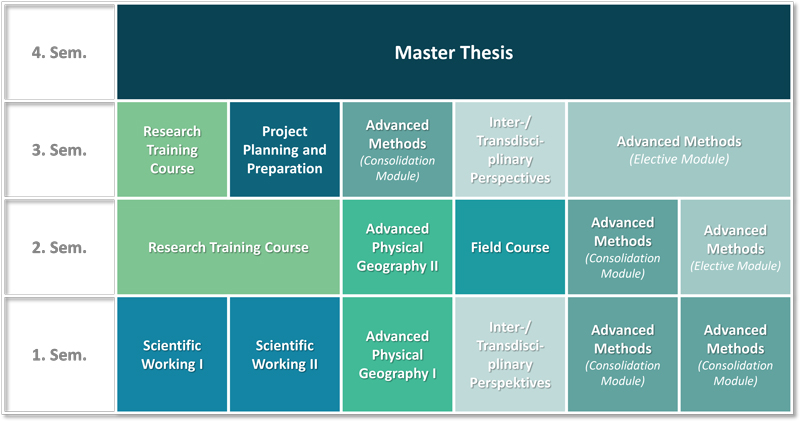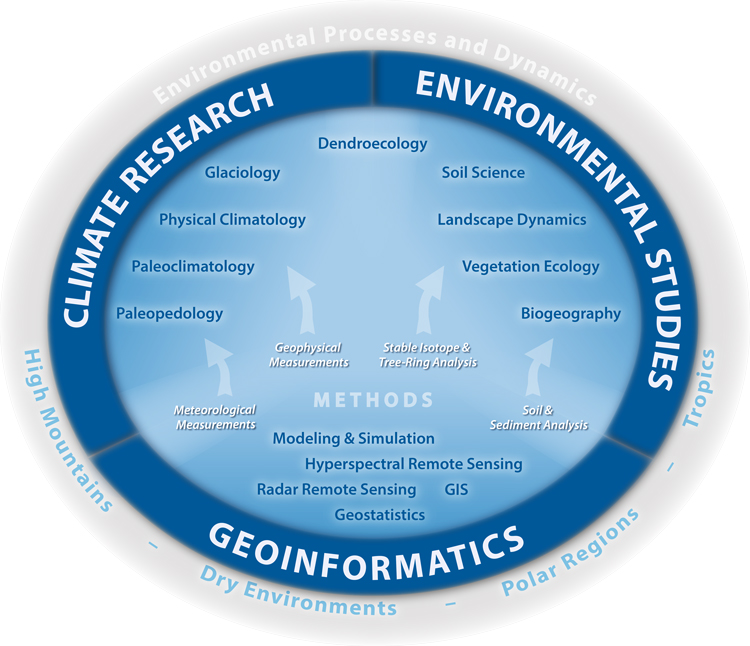M.Sc. Physical Geography: Climate and Environmental Sciences
Environmental processes and dynamics encompass many aspects of physical systems on global, regional and local scales. Accelerating climate change alters hydrological processes and biogeochemical turnover rates, affect landscape dynamics and ecological systems.
These changes impose fundamental research challenges and, as a consequence, increase the volume of spatial data. These changes are studied by the Institute of Geography in Erlangen from different research perspectives.
Research foci of the Physical Geography branch of the Institute of Geography are climate research, environmental studies, and geoinformatics, each with various sub-fields. Our institute is internationally recognized and involved in many international collaborative projects and has a special focus on high mountain regions (e.g., in the European Scandinavian Mountains, the Alps, the Andes, High Asia and the Himalayas, East Africa, the Middle East, and the Mediterranean), but also on polar regions and drylands. Besides, we are active in various projects inside Germany and the province of Bavaria. A strong link exists to Cultural Geography via the research field society-environment-interactions.
The institute has excellent research facilities in electronic data processing systems and laboratories which are intensively involved in student training to warrant a modern, practical, and applied education. In detail, the institute disposes of a soil and sedimentary lab, adendroecological lab, and a stable isotope lab. In climatology, you are trained in various meteorological measurement techniques and climate modelling, and in the field of GIS and remote sensing, you learn advanced methods of special functions, concepts, and implementation of modelling algorithms.


The fourth semester is dedicated to the Master’s thesis, which focuses on one of the chosen major topics. Semesters abroad are not compulsory, but can be arranged (e.g. through the ERAMUS programme and partnerships with universities).
The courses put these methods in the light of topical issues, for instance, understanding the interplay of climatic subsystems in the challenging environment of high mountains (atmosphere, glaciers, hydrology); practicing seasonal predictions; or sharpening the sense for future climate projections.
With our course program we aim at current and future demands and challenges in regard to processing of large data amounts (“big data”). All classes provide the opportunity to acquire versatile programming and scripting skills that enable efficient data processing as well as the customization and the development of new algorithms. This combination of geoinformatics modules with thematic knowledge links modern data analysis and acquisition techniques with an in-depth process understanding that is required and demanded for data interpretation in the respective research fields.
Here, you are trained in sampling strategies, preparation techniques and state-of-the-art analyses methods, and data assessment and interpretation. The lab courses are embedded in practical research applications like the impact of climate change on trees and forest ecosystems, climate reconstruction from natural archives, and environmental changes caused by human impact.
Please read the following carefully.
1. Due to the course structure, we strongly recommend to start in the winter term.
2. Successful applications must proof good basic knowledge in Physical Geography or a related subject as well as basic technical skill sets, e.g. GIS or programming/scripting. Note that the examination regulations require you to have at least 60 ECTS (40 ECTS for summer term 2024 according to the former version of the examination regulations) in one or more geography-related subjects (e.g. ecology, climatology/meteorology, GIS, soil science and geomorphology, hydrology, forestry, and environmental physics). Applications without specific motivation letter, with too little geography-related background, or from entirely technical subjects (e.g., mechanical engineering) will be dismissed.
3. Please be aware of the minimum Bachelor entry grade of at least 2.3 or better (without additional exam) or 2.3-2.5 (with additional exam). Grades below this threshold will be excluded from further review. Grades refer to the German higher education system or equivalent. Please note that the academic system in Germany may differ from the system in your country. Additionally, you should also be aware that the Intermediate or Pre-University College offered in a couple of countries is not accepted as an academic degree program, but as an equivalent to the German secondary schools’ upper classes.
4. If the minimum entry grade is fulfilled, yet theextent of your geography-related background is not clear enogh, we will offer you a coaching (digital meeting) after your application to help you assess the fit with our program.
5. Applicants have to proof intermediate knowledge of the English language (level B2) according to the Common European Framework of Reference for Languages or an equivalent score in an internationally recognised test. The proficiency of a basic knowledge of German (A1) has to be proven within the first academic year.
It is only possible to start studies in the winter semester. The application deadline is 31 May (start of the winter semester in October).
For more information about enrolling for the Masters program, please visit the FAU website.
For questions regarding application and admission, please contact our student advisor:
Dr. Birgit Schwabe
Wetterkreuz 15
91058 Erlangen
- Phone number: +49 9131 85-25791
- Email: birgit.schwabe@fau.de
Please also refer to our information on study registration.
No matching records found.
No matching records found.

